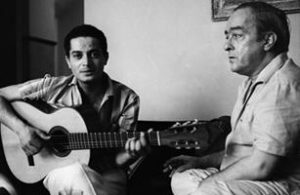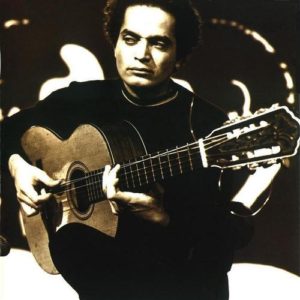Baden Powell & Vinicius de Moraes – Os Afro Sambas
 Baden Powell de Aquino, widely known as Baden Powell and born in the city of Varre-Sai in Rio de Janeiro, is immensely revered as a premier acoustic guitarist in Brazil. Baden created a guitar style that is unmatched – a classical guitar technique with popular music harmony and phrasing. Baden became known for his Bossa Nova tunes, samba, and Brazilian instrumental songs, a Brazilian style of Jazz, and MPB.
Baden Powell de Aquino, widely known as Baden Powell and born in the city of Varre-Sai in Rio de Janeiro, is immensely revered as a premier acoustic guitarist in Brazil. Baden created a guitar style that is unmatched – a classical guitar technique with popular music harmony and phrasing. Baden became known for his Bossa Nova tunes, samba, and Brazilian instrumental songs, a Brazilian style of Jazz, and MPB.
His father liked scouting therefore naming his son Baden Powell after the founder of the Boys Scouts Robert Baden Powell.
Baden started his guitar lessons with Jayme Florence, an influential choro guitarist of Rio de Janeiro, in the 1940’s. He soon was known to be an excellent guitarist and started to perform with orchestras and small ensembles.
Baden Powell became more widely known around 1959 when he teamed up with lyricist Billy Blanco. They wrote “Samba Triste” or “Sad Samba” which became known in Brazil and abroad; it was recorded by jazz musicians such as sax player Stan Getz and guitarist Charlie Byrd on their album “Jazz Samba.”
Before venturing toward new directions, Baden Powell was the house guitarist for Elenco record label, and of the Elis Regina’s and Jair Rodrigues television show O Fino da Bossa. It was in 1962 that Baden Powell meets poet and diplomat Vinicius de Moraes and, as a result, the idea of Afro-Brazilian songs put in a contemporary form was born: “Os Afro Sambas.”

Vinicius de Moraes, born in Rio de Janeiro in 1913, was known as “poetinha” – a term of endearment meaning the little poet. Vinicius’ venture into writing started in the 30’s when he wrote two poetry collections, “Caminho Para a Distancia (“Path into Distance”) (1933) and Forma e Exegese (“Form and Exegesis”). In 1943 Vinicius de Moraes entered the Brazilian Foreign Service working at the Brazilian Consulate in Los Angeles. He continued writing releasing several books Caminho Para a Distancia (“Path into Distance”) (1933) and Forma e Exegese (“Form and Exegesis”). As a diplomat he also served in Paris and in Rome. In the 50’s Vinicius de Moraes wrote film reviews for the newspaper “A Última Hora.” In 1956 he returned to Paris as a diplomat and co-wrote his first samba “Quando tu passas por mim” (“When You Go By Me”).
with Antonio Maria, a writer, chronicler and radio personality.
In 1956 Vinicius de Moraes meets pianist Antonio Carlos Jobim and started writing songs that later became known as Bossa Nova. In 1958 singer Elizeth Cardoso records the album “Canção do Amor Demais” with several compositions by Vinicius and Tom. Many consider it to be the first Bossa Nova album. Songs by Vinicius de Moraes and Tom Jobim were all time hits recorded by numerous singers and musicians worldwide such as “Garota de Ipanema” (The Girl From Ipanema), “Insensatez” (How Insensitive), “Chega de Saudade” (How Insensitive).
Vinicius de Moraes’ play “Orfeu da Conceição,” a reworking of the story of Orpheus and Eurydice and set in the carnival in Rio, was adapted into the very successful film “Black Orpheus” – it won an Academy Award in 1959 as the Best Foreign Language Film and the Palme d’Or at the Cannes International Film Festival. The film was a co-production among France, Italy, and Brazil, and included a song by Jobim and Moraes, “A Felicidade”, which became an international hit. 
In 1966 Vinicius de Moraes and Baden Powell take Brazilian music to a different direction. Here we have a phenomenal guitarist and composer and a revered poet and songwriter, Baden and Vinicius, recording the album “Os Afro Sambas” with songs such as “Canto De Ossanha”, “Canto De Iemanjá”, “Tempo de Amor” among memorable others. This album played a role in bringing about aspects of Afro Brazilian culture into Popular Brazilian Music. The two musicians brilliantly explored the Afro Brazilian religious music of Candomblé and, as a result, made it accessible to the Brazilian mainstream.
The partnership between Vinicius de Moraes and Baden Powell was one of the most intense in the poet’s career. After forming the duo, they spent almost three months living together and writing nonstop in the apartment where Vinicius lived in Laranjeiras a district in Rio de Janeiro. The partnership kept going on in many places, including Paris, where they lived for a period of time. Besides a series of sambas which had led the lyricist, Vinicius, to other music styles besides the Bossa Nova, the duo created a kind of Bahian-Carioca samba, introducing a sounding and poetry until then unpublished: The Afro Sambas.
Brazilian Music Get Together | September 21
Os Afro Sambas by Badem Powell and Vinicius de Moraes
Never miss an event! Not on our e-mail list? Join here!

